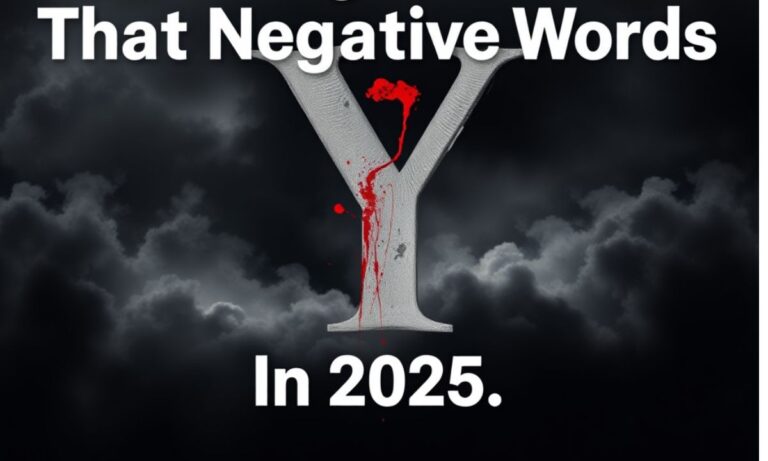Discover the extensive collection of 200+ negative words starting with “Y” that can transform your vocabulary and writing.
From expressive terms like “yowl” and “yell” that convey intense emotions, to subtler words like “yearn” that capture longing and dissatisfaction, this comprehensive guide explores the darker side of Y-words while providing valuable context for their effective usage in various communication scenarios.
READ MORE: https://fashiongravity.co.uk/negative-words-that-start-with-x/
Yowl, Yearn, Yell
The letter Y introduces us to a fascinating array of negative words that express everything from physical discomfort to emotional distress.
Words like “yowl” perfectly capture that instinctive cry of pain when we unexpectedly stub our toe in the dark—that immediate, involuntary response that echoes through our homes at inopportune moments.
The natural world demonstrates this sound too, like when coyotes communicate while hunting, creating an eerie chorus that sends shivers down the spine of anyone within earshot.
Their strategic yowling and yelping serves to disorient prey, surrounding them with confusing sounds that make escape nearly impossible—an unsettling reminder of nature’s harsher realities.
Meanwhile, “yearn” explores the psychological dimension of negativity, representing that deep, often painful longing for something beyond our reach.
This sensation frequently emerges during challenging life phases when we instinctively look backward, idealizing simpler times while conveniently editing out their difficulties.
This bittersweet emotion connects to our universal experience of loss and desire, sometimes motivating positive change but often trapping us in cycles of unfulfilled wishes and comparisons to impossible standards.
Negative Words Starting With Y To Describe A Person Or Thing
The complex dynamics between urban and rural communities have spawned various terms that highlight perceived differences in sophistication and worldview.
Words like “yokel” emerged from city environments to describe those from smaller communities, often carrying undertones of naiveté or provincial thinking.
These descriptive Y-words reveal interesting social hierarchies and assumptions about education and cultural exposure based merely on geographic origins.
The stark contrast between bustling metropolitan rhythms and quieter rural lifestyles naturally creates curiosity and sometimes judgment between these populations, with language reflecting these divides.
While terms like “yokel” imply a lack of refinement or simplicity of thought, their reception often depends entirely on delivery and intent—the same word can be either offensive or playfully self-deprecating depending on context and relationship.
This linguistic phenomenon shows how negative descriptors can sometimes be reclaimed or neutralized through careful usage and shared understanding between speakers.
Beyond human descriptions, Y-words like “yellowbelly” (suggesting cowardice) or “yackety-yak” (implying excessive, meaningless talk) provide colorful ways to identify undesirable qualities in both people and situations.
These vivid terms create immediate emotional responses in listeners, making communication more expressive and memorable than their neutral counterparts would allow.
- Yawning
- Yearning (in a negative context)
- Yucky
- Yelling
- Yellow-bellied
- Yielding (in a negative sense)
- Yoke (as in burden)
- Yonder (in a dismissive context)
- Yappy
- Yucky
- Yowling
- Yobbish
- Yowza (sarcastically)
- Yondering (in an aimless way)
- Yucky-smelling
- Yawningly (as in dull)
- Yoke-like (oppressive)
- Youthless (as in lacking vitality)
- Yapping (annoying)
- Yucky-tasting
- Yonderly (distant in a negative sense)
- Yawping
- Yonderward (dismissively referring to distance)
- Yesteryear (nostalgically negative)
- Yoke-fellow (in a burdensome partnership)
- Yearlong (tediously long)
- Yonderly (absent-minded)
- Yawp (as in loud and obnoxious)
- Yanking (as in forceful)
- Yucky-looking
Adverbs Starting With Y
Adverbs function as crucial modifiers in our language, much like bass guitarists provide essential foundation in rock bands—present but often underappreciated.
These Y-beginning adverbs add critical context and emotional shading to our verbs, adjectives, and even other adverbs, transforming basic statements into nuanced communications.
Consider the dramatic difference between merely seeing sharks fight versus witnessing them battle “yearnfully” or “yieldingly”—the adverb completely reconstructs our mental image of the event.
The adverb “yieldingly” demonstrates particular versatility by creating compelling contrasts in sentences, like when a typically rigid authority figure “yieldingly accepts” an unexpected compromise, or when an apparently solid mountain “yieldingly erodes” over millennia.
This linguistic tool adds depth by highlighting exceptions to expected behaviors or showcasing gradual surrender to inevitable forces.
Sometimes, behaving “yieldingly” represents wisdom rather than weakness, especially in high-stakes situations like navigating heavy traffic where road rage incidents can escalate dangerously.
The strategic yielding of ego or immediate advantage reflects emotional intelligence and prioritization of safety over rightness—a sophisticated rather than submissive approach to conflict.
- Yearly
- Yawningly
- Yonder
- Yellingly
- Yellowly
- Youthfully
- Yummily
- Yawingly
- Yieldingly
- Yonderward
- Yarely
- Yonderly
- Yippee
- Yawpingly
- Yesternight
- Yonderly
- Yare
- Yes (as an affirmation)
- Yonderwards
- Yawningly
- Yowlingly
- Yodelingly
- Yucky
- Yestermorrow
- Yarely
- Yachtingly
- Yondermost
- Yesterweek
- Yowza
- Yonderish
- Yonderlike
- Yowling
- Yawning
- Yarely
- Yappingly
- Yesterevening
- Yonderwardly
- Yearnfully
- Yonderwardly
- Yonderish
Obscure Words Starting With Y
Exploring obsolete or uncommon Y-words offers fascinating glimpses into historical cultures and communication patterns while enriching modern expression with forgotten linguistic treasures.
These terms often preserve concepts that mainstream language has simplified or combined into broader categories, reflecting how perception and priorities shift across generations.
The Scottish term “yallacrack,” for instance, vividly captures the specific chaos of late-night urban disturbances—whether outside bars at closing time or at transportation hubs when flights are canceled—with an onomatopoeic quality that “commotion” or “disturbance” simply cannot match.
Such precise vocabulary allows writers and speakers to create more accurate and evocative descriptions, engaging audiences through unexpected word choices.
Obscure terms like “yagiment,” “yaffle,” and “ylephobia” might initially seem impractical for everyday use, but they offer opportunities to spark curiosity and conversation when strategically incorporated into modern communication.
Their unfamiliarity draws attention and creates memorable moments in otherwise ordinary exchanges, making them valuable tools for educators, writers, and speakers looking to distinguish their content.
Additionally, these linguistic artifacts preserve cultural knowledge and historical perspectives that might otherwise disappear entirely from our collective consciousness, serving as small windows into past worldviews and concerns.
- Yaffle
- Yare
- Yawp
- Yonder
- Yclept
- Yonderly
- Yonic
- Yarely
- Yawingly
- Yestern
- Yewen
- Ylem
- Yowl
- Yobbish
- Ylang-ylang
- Ylem
- Yurt
- Yaffle
- Yondermost
- Yaw
- Yawing
- Yarely
- Yonic
- Yob
- Yawpingly
- Yestermorrow
- Yonderward
- Yatter
- Yowza
- Yare
- Yawping
- Yawped
- Yawler
- Yawps
- Yclept
- Yaffle
- Yonderish
- Yowling
- Yow
- Yonderlike
- Yesterevening
- Yarely
- Yawp
- Yondermost
- Yareful
- Yawper
- Yaffle
- Yesternight
- Yawped
- Yare
- Yowled
- Yore
- Yaffle
- Yabber
- Yaw
- Yarr
- Yestertide
- Yawley
- Yare
- Yonderwardly
- Yex
- Yaffle
- Yesterweek
- Yawpery
- Yonderwise
- Yonderward
- Yawingly
- Yonderlike
- Yarely
- Yonderward
Unusual Words Starting With Y
While clarity remains essential for effective communication, exclusively using common vocabulary can create monotonous, forgettable content that fails to engage readers or listeners.
Strategic incorporation of unusual Y-words adds texture and interest to writing without sacrificing comprehensibility—much like seasoning enhances a meal without overwhelming its fundamental flavors.
The term “yobbery,” emerging from British street culture, exemplifies how specialized vocabulary can efficiently communicate complex social phenomena—in this case, disruptive behavior patterns among troubled youth. Its clever etymological construction (reversing “boy” to create “yob”) demonstrates how language evolves playfully even when describing serious subjects.
Physical evidence of “yobbery” like graffiti, vandalism, and property destruction serves as visible manifestations of deeper community issues, making this uncommon term a useful shorthand for discussing broader social concerns.
Words like “yeasty” (fermented/frothy), “yawl” (small sailing vessel), and “yataghan” (Turkish sword) represent specialized vocabulary from various domains that can add precision and cultural depth to descriptions.
Their unfamiliarity creates momentary cognitive pauses that actually enhance reader engagement rather than hindering it—providing small opportunities for learning within larger communications.
- Yaffle
- Yare
- Yawp
- Yonder
- Yclept
- Yonic
- Ylem
- Yawingly
- Yobbish
- Ylang-ylang
- Yurt
- Yowza
- Yabber
- Yowling
- Yarely
- Yonderly
- Yawped
- Yawper
- Yestern
- Yondermost
- Yareful
- Yawpingly
- Yonderward
- Yestermorrow
- Yex
- Yaw
- Yesternight
- Yonderish
- Yawler
- Yarely
- Yonderwise
- Yow
- Yabbering
- Yonderwardly
- Yowled
- Yawping
- Yonderwardly
- Yaffle
- Yawp
- Yare
- Yestermorn
- Yondermost
- Yawped
- Yonderlike
- Yowza
- Yawley
- Yawpers
- Yabber
- Yareful
- Yonderward
More Vocabulary Words Starting With Y
Time-related Y-words like “yestereve” demonstrate how language constantly evolves, with some previously common terms falling into disuse while core concepts remain.
This particular example—referring to “the day before yesterday”—shows how English has generally shifted toward more direct phrasing over poetic compression, despite exceptions like “yesterday” which survive from older linguistic forms.
The continued existence of terms like “Christmas Eve” and “New Year’s Eve” alongside the obsolescence of “yestereve” highlights how cultural significance and frequency of use determine which words remain in active vocabulary.
Temporal terms starting with Y connect to our fundamental human experience of time’s passage and our efforts to organize memories and experiences into manageable units that can be efficiently referenced.
Beyond time references, specialized Y-vocabulary like “yarborough” (a hand of cards with no card above nine), “yantra” (Hindu geometric diagram), and “yardang” (wind-carved ridge) opens windows to diverse domains from games to spiritual practices to geological processes.
These words contain concentrated knowledge from specific fields, offering concise ways to discuss specialized concepts without lengthy explanations.
Collecting these less common Y-terms creates a valuable linguistic toolkit for precise expression across multiple subjects, enriching both everyday conversation and formal writing with greater specificity and cultural awareness.
- Yaffle
- Yare
- Yawp
- Yonder
- Yclept
- Yonic
- Ylem
- Yawingly
- Yobbish
- Ylang-ylang
- Yurt
- Yowza
- Yabber
- Yowling
- Yarely
- Yonderly
- Yawped
- Yawper
- Yestern
- Yondermost
- Yareful
- Yawpingly
- Yonderward
- Yestermorrow
- Yex
- Yaw
- Yesternight
- Yonderish
- Yawler
- Yarely
- Yonderwise
- Yow
- Yabbering
- Yonderwardly
- Yowled
- Yawping
- Yonderwardly
- Yaffle
- Yawp
- Yare
FAQ’s
How can negative words affect our mindset?
Negative words directly influence neural pathways, triggering stress responses and reinforcing pessimistic thought patterns.
Can awareness of negative words lead to a more positive mindset?
Recognizing negative language patterns allows for conscious substitution with positive alternatives, gradually rewiring thought processes.
How can I avoid using negative words in my communication?
Practice mindful pausing before speaking to select constructive alternatives that convey your message without unnecessary negativity.
Are negative words starting with Y always harmful?
Context determines impact—these words serve important expressive functions when used appropriately rather than habitually.
How can I shift from negative self-talk to positive self-affirmation?
Replace critical inner dialogue with supportive statements while acknowledging challenges in balanced, solution-focused language.
Conclusion
Exploring negative words that start with “Y” reveals the remarkable linguistic depth even within a single letter of our alphabet.
From commonplace terms like “yell” to obscure expressions like “yallacrack,” these words provide essential vocabulary for expressing difficulties, challenges, and unpleasant experiences that form an inevitable part of human communication.
Their existence reminds us that language must encompass the full spectrum of human experience, allowing us to articulate discomfort and dissatisfaction with precision and nuance.
The strategic use of these negative Y-words can actually enhance our communication effectiveness despite their pessimistic connotations.
When employed mindfully, they add emotional resonance, create memorable descriptions, and facilitate honest dialogue about challenging situations.
Rather than avoiding negative terminology entirely, we benefit from understanding its proper application and balanced integration with positive language, creating more authentic and comprehensive expression that reflects life’s complex realities.

I’m Irfan, an experienced SEO content and SEO specialist with 2 years of expertise, currently contributing to Al Jazeera News Website.





